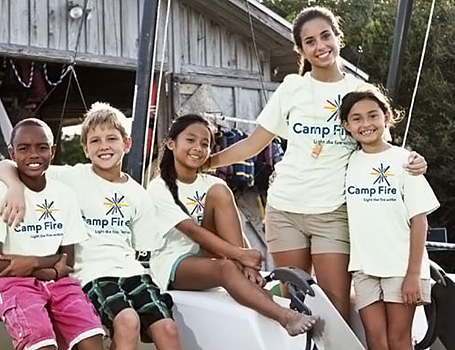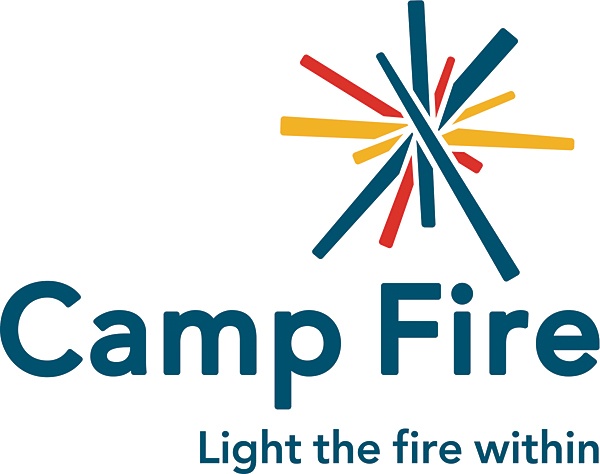Camp Fire is a youth development organization in the United States. It seeks to build confidence in children and teenagers, to provide leadership experiences, and to improve the conditions in society that affect young people. Camp Fire builds partnerships with educational institutions, community organizations, and families to engage young people in programs and activities that prepare them to live fully in a diverse and complex world. The majority of young people in Camp Fire programs are between 5 and 17 years old.

Camp Fire programs
Camp Fire activities are administered under three types of programs: (1) out-of-school-time programs, (2) environmental and camp programs, and (3) teen service and leadership programs.
Out-of-school-time programs (OST)
take place during the school year. Children and teens in these programs participate in indoor and outdoor age-appropriate small group activities in which they can explore personal interests, learn to make healthy choices, develop social skills, and have fun. OST programs include before- and after-school, school break, tutoring, mentoring, and club programs; and short-term courses. After-school programs are offered three to five days a week during the school year to meet the needs of participants and their families.
Environmental and camp programs
provide opportunities for young people to learn about and explore nature while developing a lifelong appreciation of and respect for the outdoors. The programs allow youth and teens from different backgrounds to develop important skills, such as socialization, self-reliance, problem solving, and an appreciation of and commitment to nature. Outdoor programs include resident camp, day camp, environmental education, and day trips.
Teen service and leadership programs
provide a variety of community service and leadership opportunities to help teenagers develop as effective and engaged citizens.
Teens in Action
is a youth-led and youth-driven program guided by trained adults. Teenagers in this program learn to identify community needs, decide what issues they want to address, and then take action to make a difference in their communities.
Youth advisory councils
ensure that young people have a voice in local and program planning and decision making.
Camp counselor-in-training program
prepares people aged 16 and older to serve in leadership roles in Camp Fire camps. These opportunities provide personal and early professional development for young people.
Organization
A board of trustees manages Camp Fire. The board establishes national policies, sets up organizational requirements and standards, and charters local councils and community partners. Community partners include companies, schools, faith-based groups, and other organizations that help carry out Camp Fire programs.
Camp Fire receives funding from a variety of sources. These sources include contributions from individuals, grants from government agencies and foundations, and funds from the United Way.
The corporate headquarters of Camp Fire are in Kansas City, Missouri. The corporate office supports Camp Fire programs and provides such services as marketing, merchandising, curricula research, evaluation, council consultation, and training.
History
Camp Fire was founded in 1910 by Luther Halsey Gulick, an American physical education teacher, and his wife, Charlotte Vetter Gulick. They created Camp Fire to guide young people on their journey to self-discovery. The Gulicks believed that young people should have experiences to help them learn to care for themselves, their environment, and the people around them.
Originally, only girls could join Camp Fire groups. But in 1975, Camp Fire began admitting boys at all program levels. In 1979, the organization changed its official name from Camp Fire Girls, Inc., to Camp Fire, Inc. The organization became known as Camp Fire USA in 2001. It became known as Camp Fire in 2012.

See also Camping; Gulick, Luther Halsey.
